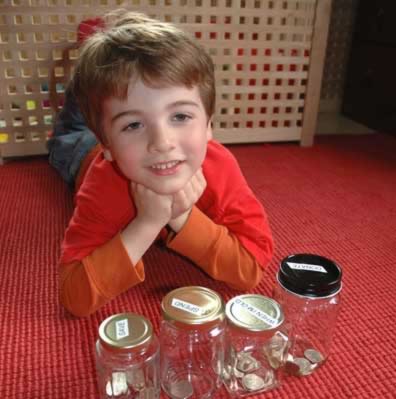Wants, needs, and the sense of entitlement
I've been working with a lot of people lately who can't tell when enough is enough. Termed “Princesses”, these babes have a sense that they can have whatever they want, whenever they want it. And while people might look at them dumb-struck at their sense of entitlement, there are more of them than you might guess.
When I ask people why they buy stuff, they tell me it's because they need it — whatever IT is. But that's not always true. In fact, that's hardly ever true. Fact is, many people don't need most of the stuff they buy — they want it.
It's easy to confuse needs with wants. You work hard and deserve nice things, right? Whether you're thinking about buying a big-ticket item (we need a vacation) or smaller impulse purchases (I need a double-tall latte with Venetian chocolate), your sense of entitlement can muddy the waters when it comes to what you want and what you really need.
How Budgeting Leads to Freedom
Imagine the freedom to never worry about money. Some dopes think that means having so much of the green stuff that you could never spend it all. But bad money management has put many a Richie Rich in the poor house. No, I'm talking about the kind of freedom that comes from being in control of your dough. I'm talking about a budget.
I know budgets aren't romantic. And for all those people who feel they're entitled to buy whatever they want, whenever they want it, a budget can seem like kryptonite. But you can choose to continue to see a budget as a major pain in the butt, or you can choose to see it as a useful tool that helps you spend your money on the things that are most important to you.
By Any Other Name...
Once upon a time to try and get away from the stigma the word “budget” carried, I took to calling them “spending plans.” But you know what? It wasn't the word people hated — it was the discipline, the work, the focus required to pre-determine how much you were going to spend, and then spend no more.
Re
How to Cope with Budget Blow-Ups
Despite the best laid plans of mice and men, there are times when the unforeseeable just waltzes into your life and poops on your budget. Sure you have a budget of $400 a month for groceries. But then:
-
- Your brother and sister-in-law and their four kids came for a week.
-
- Or when you least expect it, your best friend announces she's getting married and you have to find a way to pay for a $200 dress.
Allowance: For learning or reward?
Children receive mixed messages about money. At home they hear one thing, at school and among their peers another. Dad does it one way. Mom is the complete opposite. What is consistent is that nobody seems able to agree on the money rules. And often those mixed messages stay with kids long after our parental influence has passed.
One of the most hotly-debated issues when it comes to kids and their allowances is the idea of what an allowance should be tied to.

Where’s the money, honey? Why you MUST track your spending
People are always scratching their heads about where their money goes. I get letters and emails every week bemoaning the fact that although they seem to make a good income, some folks just can't get to the end of the month before they get to the end of the money. Of the hundreds of people I've worked with on Til Debt Do Us Part, only one person actually knew what she was spending. Astounding.
So, do you know what you're spending every month? If you don't know where your money is going, how can you ever hope to know what you may be over-spending on?
Unconscious spending is at the crux of the problem for most people who see their circumstances change even slightly:
Bargain Shopping Gone Berserk!
Who doesn't love a good sale? But when bargain-hunting, coupon clipping, or mastering the deal becomes the objective, you and your budget are likely headed for big trouble. I can't tell you the number of people who have said, “But it was such a deal!” Really? You spent the money you need to have available to pay off your credit card balance in full — but it was a deal? Hmmm.
- If you're spending money you don't have — if you're putting it on credit and not paying it off in full by the end of the month — it's not a deal.
- If you're buying something you don't need, it's not a deal.
- If it takes you three weeks, three months, or never to put what you bought to use, it's not a deal.
A deal is buying the snowsuit your child is going to wear next winter on sale at the end of this winter at 70% off. A deal is picking up a new book you know your sister is dying to read for half price. A deal is getting something you really need or want at a significant savings — and being able to pay for it in cash.
There are some places that are known for having “deals”, and people take the value they're getting for granted without actually checking the prices. Dumb! And there are people who will go to extremes to get a deal, lining up for hours to browse — and ultimately buy — in stores where they wouldn't normally shop. Whazzup with that?
Shopping for
The Ways and Means of Coping with Emergencies
Experts have been touting the importance of having an emergency fund since Moses was a lad. So why is it that so many people still don't have enough (or any?) money set aside just in case? Reasons and rationales abound.
“I'm paying off my debt. That's the most important thing.”
With the amount of debt people are buried in, it's no wonder people want to get rid of it as fast as they can. But having a single focus is never a good way to create balance. Money in the bank gives you options — ways to deal — so that you can stay on track with debt repayment even when bad things happen.
Having no cash at the ready means you'll no doubt be forced to use your credit to deal with a broken furnace, unexpected medical bills, or replacing that tire you blew on the highway. Accessible cash means you can keep to your debt-repayment plan and deal with whatever crisis — large or small — that has come knocking on your door.
<
Learning to live modestly
Frugality is all the rage. And a good thing too. With the economic situation as it is, we had better learn to take pleasure from the simple things if we want to keep our sense of balance and be able to sleep at night.
The Rise of Materialism
Before the advent of retirement savings plans, government pensions and a social safety net, most people had to save without incentive by living modestly. Frivolous, uncontrolled spending was virtually unheard of because the risks were so huge. If you go into homes that are 60 years old, the cupboards are tiny. That's because nobody had much stuff. Kids slept two or more to a room, sometimes two to a bed! And people made do with just one or two of anything.
How many different pots do you have in your kitchen? How many pairs of shoes do you own? What about sweaters, t-shirts, pants, skirts, bottles of perfume, ties, scarves, purses, face creams? How about CDs and DVDs? What about sound devices like radios, stereos, iPods? How many telephones are there in your house? How many televisions? How many tools, hair clips, sets of dishes?

